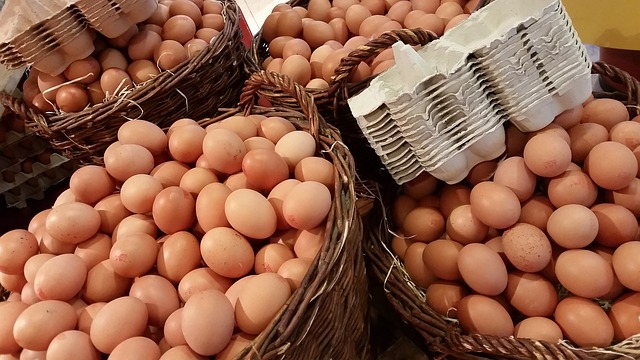Almost everything has become increasingly expensive, from rent to transportation and even groceries.
However, if you’ve been out shopping for your weekly groceries, you must have noticed the exorbitantly high prices of eggs.
Eggs are now so expensive, going for as much as $5.87 at the Hawthorne Neighbourhood market. And this is a drop in price as some places were selling them for as much as $18+ just a few months ago.
So, why are eggs so expensive? In the previous year, a highly contagious avian flu outbreak resulted in a substantial loss of egg-laying hens, leading to a decline in the availability of eggs.
Furthermore, both animal feed and fuel have become exceedingly expensive, and the consumers, you and I, have to cushion that extra cost.
Stick around as we analyze the outlook for egg prices in 2023, bringing you the best egg bargains in the market right now.
Average Price of Eggs 2023
The year 2023 has seen a notable escalation in the average price of eggs, as reported by the U.S. Bureau of Labor Statistics.
In December, the cost of a dozen large Grade A eggs soared to $4.25, a substantial rise from the previous year’s price of $1.79.
This surge in price has undoubtedly impacted consumers and raised concerns about the affordability of this essential food item.
Furthermore, when comparing the data from January 2022 to January 2023, it becomes evident that egg prices experienced a staggering increase of 70%.
This surge far exceeds the general grocery price inflation, which stood at approximately 11% during the same period. These statistics shed light on the exceptional price volatility specifically witnessed within the egg market.
Dozen Eggs Price Today at Walmart
If you’re in search of affordable and quality eggs, Walmart offers a variety of options to suit your needs.
With a range of sizes and types, their Great Value brand ensures you’ll find the perfect dozen eggs at competitive prices. Here’s an overview of the current prices for a dozen eggs at Walmart:
Great Value Cage Free Large AA White Eggs, 18 Count: Indulge in the goodness of cage-free eggs for just $3.14. That’s approximately 17.4 cents per egg, providing you with high-quality eggs. Here are some of the options they have;
- Great Value Cage Free Large AA White Eggs, 12 Count: For a smaller quantity, the 12-count package is available at an affordable price of $2.13. This translates to approximately 17.8 cents per egg, allowing you to enjoy the same great taste and quality in a more compact package.
- Great Value Cage Free Extra Large AA White Eggs, 18 Count: If you prefer larger eggs, Walmart offers a dozen of these extra-large cage-free eggs for $3.52. At approximately 19.6 cents per egg, you can enjoy the delightful flavors of extra-large eggs without breaking the bank.
- Great Value Cage Free Jumbo A White Eggs, 12 Count: For those seeking eggs of substantial size, Walmart provides a dozen jumbo eggs at $2.66. With approximately 22.2 cents per egg, you can savor the richness of jumbo-sized eggs in your favorite recipes.
With these options, Walmart ensures that you can find the ideal dozen eggs to meet your preferences and budget.
Whether you opt for cage-free, large, extra-large, or jumbo eggs, Walmart’s Great Value brand promises both quality and affordability.
Please note that prices are subject to change, and it’s always advisable to check with your local Walmart store or their online platform for the most up-to-date pricing information.
Is There a Shortage of Eggs?
Yes, there is a shortage of eggs in the country, though not as acute as it was towards the end of 2022.
The main contributing factor to the current state of the egg market is the avian flu outbreak that occurred in the previous year.
This deadly flu resulted in a significant loss of egg-laying hens, affecting the egg supplies in some areas. While the impact of the outbreak varied across regions, it did lead to a reduction in egg availability and an increase in prices in certain affected areas.
Additionally, inflation and rising production costs have also played a role in influencing egg prices.
Increased feed and fuel costs, among other expenses, have put pressure on egg producers, potentially affecting the pricing of eggs at the retail level.
It is important to note that the availability and pricing of eggs can vary by location. Some regions may experience tighter supplies or higher prices due to specific factors such as transportation logistics, localized market dynamics, or regional regulations affecting the poultry industry.
So, Why are Egg Prices So High?
Here are some of the major reasons why egg prices are so high right now;
1. Avian Flu
The avian flu wiped out a considerable percentage of egg-laying hens. About 58 million chickens died from the flu.
That’s a big supply of eggs wiped out in less than a year. Before more chickens reach egg-laying age, the egg shortage will continue to be a headache for most households.
The flu has had a direct effect on the eggs produced. Supply hit record lows, and demand shot up.
2. War in Ukraine
Yes, I know, we have been blaming almost everything on the war in Ukraine. However, you’d be surprised how intertwined global economies are.
Ukraine is one of the biggest producers of grain worldwide. As a result of the war, US farmers have had a shortage of feed.
Feeding costs have risen from about $50 to %100 annually, a cost that has been passed on to the consumer. Egg prices have increased from about 18 cents to as much as 35 cents per egg.
3. Easter Celebrations
Easter celebrations impact egg prices due to increased demand and changes in consumer behavior during this festive season.
The demand for eggs tends to rise during Easter as they are widely used for various traditional activities such as egg hunts, egg decoration, and Easter baking.
The increased demand for eggs during Easter can lead to temporary price fluctuations in the market.
As more consumers seek to purchase eggs for their Easter-related activities, the demand may outpace the regular supply, resulting in a short-term increase in prices.
Moreover, Easter celebrations also affect the production and distribution of eggs. Egg producers often anticipate the higher demand during this period and adjust their production schedules accordingly.
However, due to the specific requirements of egg-laying hens and the time needed to increase production, there may be limitations to meeting the sudden surge in demand during the Easter season. Especially now that so many farms were affected by the bird flu. This can put additional pressure on the supply chain and contribute to price fluctuations.
4. Rising Production Costs
Rising production costs have a significant impact on egg prices in the market. Egg production involves various expenses, and when these costs increase, it puts pressure on egg producers, ultimately leading to higher prices for consumers.
Labor costs contribute to rising production expenses. The wages and benefits of farm workers involved in egg production can increase due to factors such as minimum wage laws, labor market conditions, or changes in labor regulations. As labor costs rise, egg producers may need to adjust their pricing to cover the additional expenses.
Utilities, including electricity, heating, and cooling, are vital for maintaining appropriate conditions in egg production facilities. Any increases in utility rates can add to the production costs for egg farmers.
Furthermore, transportation costs for delivering eggs from farms to retail locations or processing facilities can rise due to factors such as fuel prices or changes in transportation regulations, further impacting the overall production costs.
5. Rising Inflation
Due to inflation, 2023 has become the year of price hikes and surges in the prices of almost everything, including eggs. Inflation refers to the general increase in prices over time, eroding the purchasing power of money.
When inflation occurs, it can lead to higher prices for inputs, production expenses, and transportation, all of which contribute to the final cost of eggs.
One of the ways inflation affects egg prices is through the rising cost of production inputs.
Egg production relies on various inputs, including feed, fertilizers, equipment, and packaging materials. As inflation occurs, the prices of these inputs tend to increase.
Transportation costs are another area where inflation can influence egg prices. Inflationary pressures can lead to higher fuel prices, which affect the cost of transporting eggs from farms to processing facilities or retail locations.
Additionally, inflation may impact the prices of vehicle maintenance and other transportation-related expenses. These increased costs can be passed on to consumers through higher egg prices.
Read Also: Why is Tacrolimus Ointment So Expensive?
Are Cheap Eggs as Good as Expensive Eggs?
The quality of eggs is not solely determined by their price. While expensive eggs may be associated with certain production methods or labels that imply higher quality, the overall quality of eggs can vary based on several factors, regardless of their price.
One important factor affecting the quality of eggs is the farming method. Eggs from free-range or organic farms, where hens have access to outdoor areas and a more natural diet, are often considered to have higher quality in terms of animal welfare and potentially nutritional content.
These production methods usually involve higher costs, which can contribute to the higher prices of such eggs.
However, it is worth noting that eggs from conventional farms can still meet regulatory standards and provide adequate nutrition.
Ultimately, the taste and preference for eggs can vary among individuals. Some people may perceive a difference in taste or texture between eggs of different qualities, while others may not.
Factors such as personal preferences, culinary applications, and cultural influences can all play a role in determining what individuals consider as “good” eggs.
How to Get Eggs at a Bargain
With prices of almost everything going up and inflation rates at a record high, everyone is trying to cut spending as much as possible. At this point, it’s a struggle between paying rent that’s gone up 100% in some places, or completely cutting down on premium items.
But, do not despair. We have a quick hack for you to find the best-priced eggs in the country. An 18-pack at My Kroger is going for $1.89. Rates may vary by the time you go shopping, but hopefully, they’ll keep the rates low.
You can also get eggs for as low as $1.82 if you live close to Macedonia Supercentre. Here’s an interesting website called eggspensive that is tracking egg prices in the country.
Will Egg Prices Go Down in Future
Yes, egg prices are set to go down in the future. This is the average price of eggs in 2023 as from January to May;
| May 2023: | $2.666 |
| Apr 2023: | $3.270 |
| Mar 2023: | $3.446 |
| Feb 2023: | $4.211 |
| Jan 2023: | $4.823 |
Source; Federal Reserve Bank of St. Louis
There are several reasons why eggs are getting cheaper. One is because of the laws of demand and supply.
The higher the prices, the less people are willing to buy eggs. Or rather, people will buy fewer eggs or substitute them with some other protein source.
Demand falls, and when that happens, prices fall. Also, eggs are highly perishable. For example, this store was selling its eggs at a throwaway price because they were about to expire.
Another reason why the egg prices will keep falling is that there are more chickens now to replace the huge number that was lost during the bird flu epidemic. This will increase production and eventually return the egg market to pre-avian flu prices.

